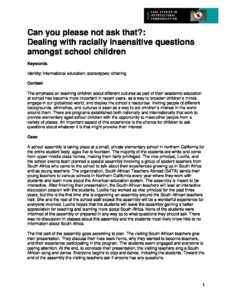Can you please not ask that?: Dealing with racially insensitive questions amongst school children
Keywords
identity; international education; stereotypes; othering
Context
The emphasis on teaching children about different cultures as part of their academic education at school has become more important in recent years, as a way to broaden children’s minds, engage in our globalized world, and display the school’s resources. Inviting people of different backgrounds, ethnicities, and cultures is seen as a way to aid children’s interest in the world around them. There are programs established both nationally and internationally that work to provide elementary aged school children with the opportunity to meet other people from a variety of places. An important aspect of this experience is the chance for children to ask questions about whatever it is that might provoke their interest.
Case
A school assembly is taking place at a small, private elementary school in northern California for the entire student body, ages five to fourteen. The majority of the students are white and come from upper middle class homes, making them fairly privileged. The vice principal, Lucille, and the school events team planned a special assembly involving a group of student teachers from South Africa who came to the school to talk about their experiences growing up in South Africa and as young teachers. The organization, South African Teachers Abroad (SATA) sends their young teachers to various schools in Northern California every year where they work with students and learn more about the American education system. The assembly is meant to be interactive. After finishing their presentation, the South African teachers will lead an interactive discussion session with the students. Lucille has worked as vice principal for the past three years, but this is the first time she is organizing an assembly around the South African teachers visit. She and the rest of the school staff expect the assembly will be a wonderful experience for everyone involved. Lucille hopes that the students will leave the assembly gaining a better appreciation for teaching and learning more about South Africa. None of the students were informed of the assembly or prepared in any way as to what questions they should ask. There was no discussion in classes about this assembly and the students most likely know little to no information about South Africa.
The first part of the assembly goes according to plan. The visiting South African teachers give their presentation. They discuss their lives back home, why they wanted to become teachers, and their experience participating in this program. The students seem engaged and everyone is paying attention. At the end, to conclude their presentation, the visiting teachers sing a South African song and dance. Everyone begins to clap and dance, including the students. Toward the end of the assembly the visiting teachers ask if anyone has any questions.
At first the questioning is going well. Students are asking polite, respectful questions that show they are genuinely engaged, even the young students are trying their best to remain focused. Students ask about the teacher’s backgrounds, what they like best about America, and what they learned so far about teaching. Then an 8th grader asks an inappropriate and culturally insensitive question: “Do the South African teachers appreciate being in America and having access to electricity and internet access in comparison to their mud huts back home?” It is clear that the student has a very limited knowledge as to what life in South Africa is like. The other students laugh out of nervousness and confusion. Lucille becomes furious and ashamed, looking at the other teachers who are all glaring at the students. The entire assembly appears uncomfortably silent. The visiting South African teachers look at each other nervously, trying to find a way around the question, as they explain that they have many resources in South Africa and do not live in mud huts. Everyone attempts to move forward, but at this point the students are distracted and the school teachers are embarrassed. Lucille tries to think of ways to rectify the situation, but finds no clear answer. Eventually the assembly ends and the South African teachers quickly leave.
Discussion Questions
As you consider this case, discuss:
- How could the school better prepare the students for this assembly? Could the teachers have done something to prevent this?
- Should Lucille, the vice principal and organizer of this assembly, take responsibility and address the incident that happened?
- How should the school address the incident? If the school chooses to apologize to South African Teachers Abroad then who should be involved in the apology?
- How could the South African teachers have better prepared to deal with uncomfortable or inappropriate questions?
- Should the school continue to foster a relationship with the South African Teachers Program?
Additional Resources
- How to Start Talking About Race in the Early Elementary Classroom – Sarah Gosner, Edutopia, the George Lucas Educational Foundation
- How Should I Talk about Race in My Mostly White Classroom?– Anti-Defamation League
- Tips on Teaching about Africa » African Studies Center – Boston University Pardee School of Global Studies
- What Do We Want Children to Learn About Africa? – Teaching for Change – Margy Knight, Teaching for Change
Corresponding Author
Hubbard, Caroline, American University, School of International Studies, Washington DC, United States. Email: ch5224a@student.american.edu


